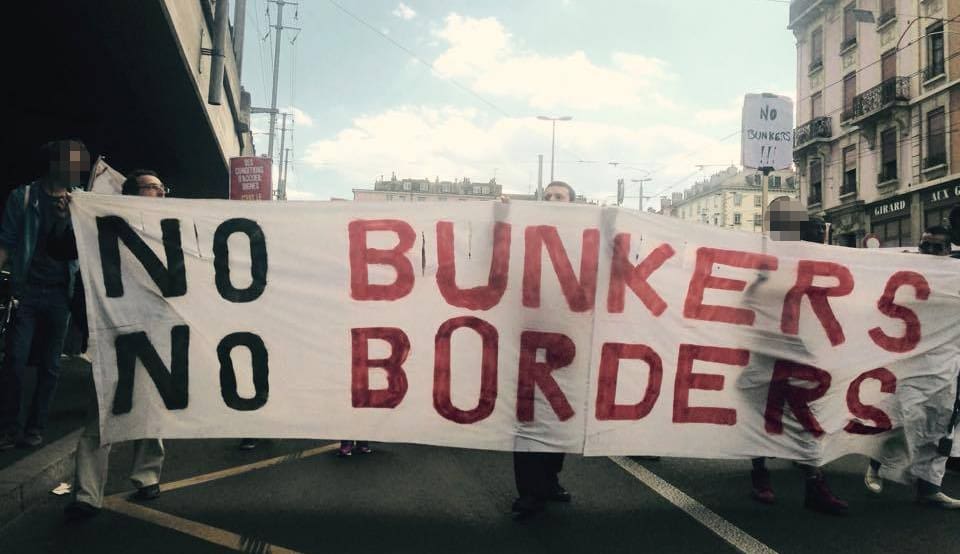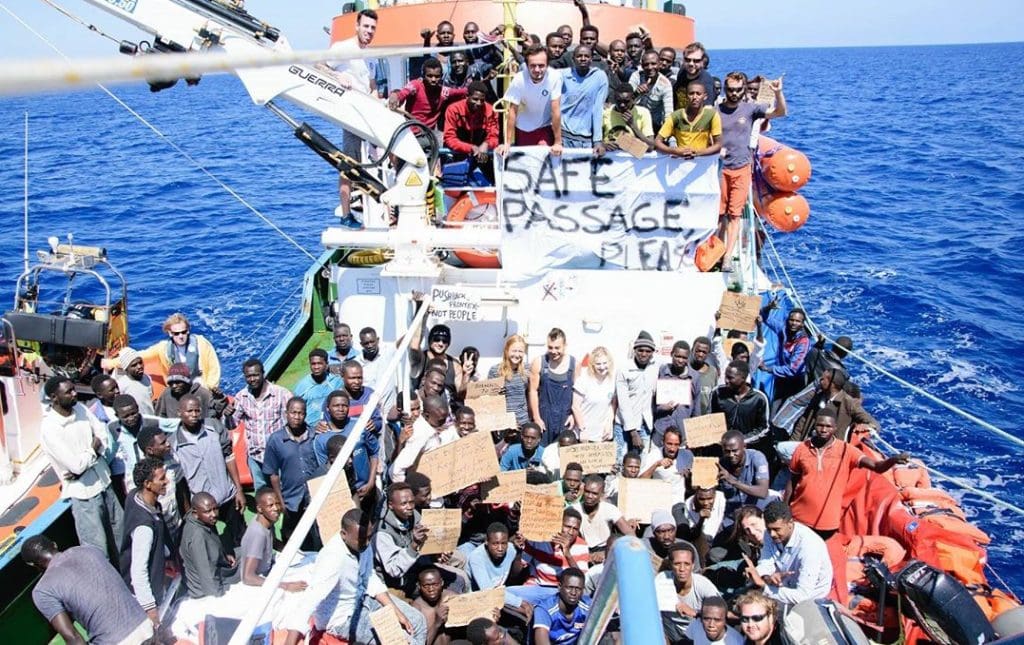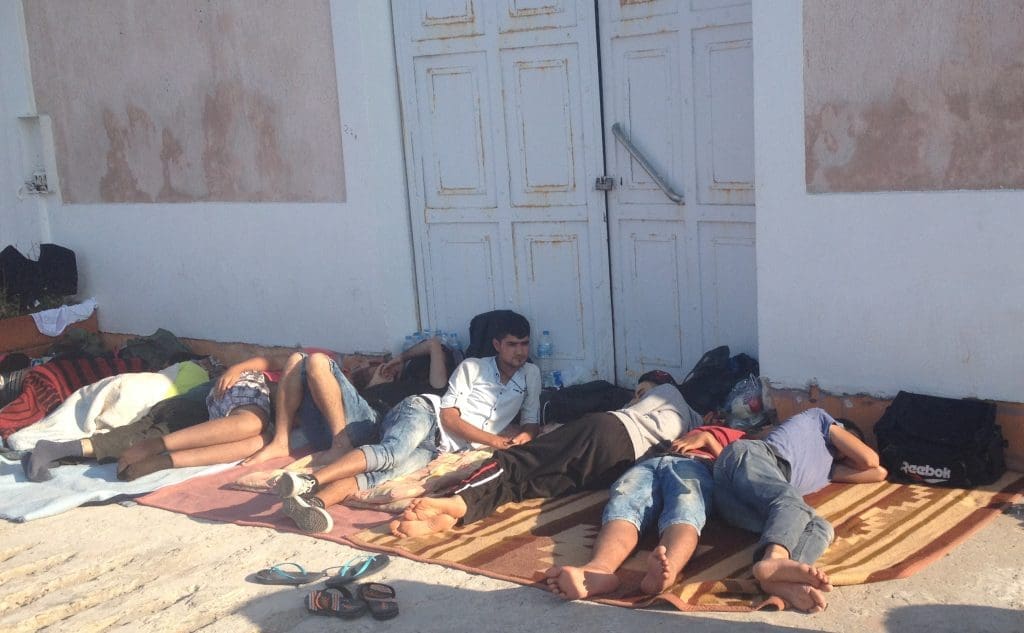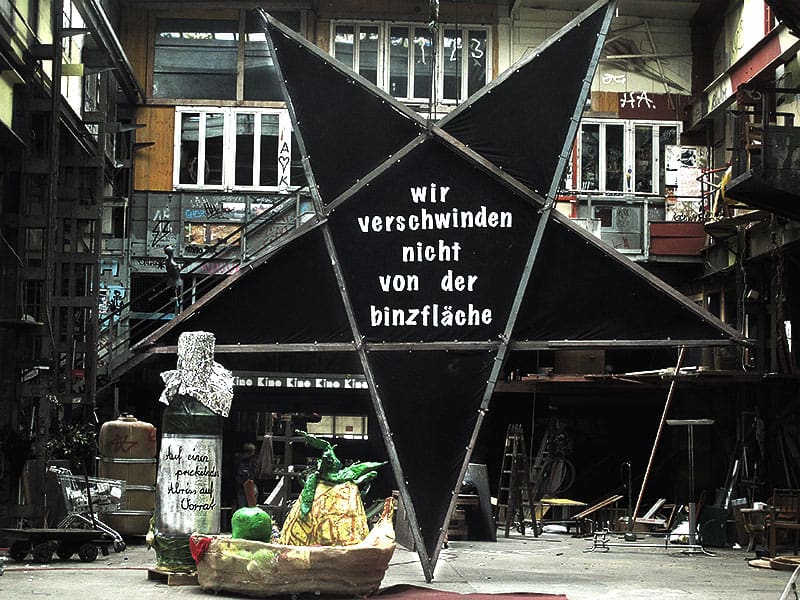AntiNote: This article originally appeared in German in the Papierlose Zeitung, the refugee-produced newspaper put out through the Autonomous School of Zurich. We have not reproduced link citations, they are in German anyway—the curious/bilingual can find them in the original.
Three years ago there was international outcry, with words like “apartheid” even being dusted off, when the city of Bremgarten (canton Aargau) tried to prohibit refugees from entering certain parts of town, including public swimming pools and other social gathering places. We find it remarkable that now, with the border crisis having escalated considerably in the intervening years, and with the security clampdowns being applied by European states also becoming more harsh and brazen, there seems to be so little reaction to new measures that severely restrict refugees’ freedom of movement and expel them, if not from the country, at least from society.
What changed that made this abuse suddenly acceptable? Maybe people just don’t know. Well, now you do.
How to Build an Invisible Prison
by Rosa La Manishe for the Papierlose Zeitung (Zurich)
1 September 2016 (deutsche Originalversion kann hier eingesehen werden)
Under the auspices of Canton Zurich’s Security Branch, an insidious policy has been developing in recent months, through which women and men, neither guilty nor suspected of any crime, are trapped within the borders of the district they inhabit, and are threatened with prison or large fines should they challenge the regulation and assert their right to freedom of movement. Especially shocking is the broad consensus accompanying these new measures: we have clearly arrived at a moment when it has become widely accepted to systematically strip certain people of their basic rights.
The life of an undocumented migrant in Switzerland is a bitter one. Anyone who, full of hope for a better future, crossed the country’s border without valid documents, or whose application for asylum was turned down bureaucratically but who cannot return or be deported back to their country of origin, faces an anxious life of unremitting poverty and insecurity. Many sans papiers are assigned to emergency shelters, where they live on just under nine dollars a day (CHF 8.50), with the fear eating at them constantly that the police will show up and take them to jail at any moment. These people know rights no longer: they are systematically denied any and all social access—to say nothing of participation in democratic discourse. Our society has plugged its ears to their voices, blindfolded itself to their needs.
Now the canton has instituted a new practice that puts sans papiers under additional pressure, seeking their complete subjugation. The migration office is increasingly issuing “bounding orders,” i.e. movement restrictions for people without legal residence status: their presence is allowed only within the municipal borders of the town or community to which they were relegated. Exceptions are made only for official business such as court appearances, prearranged community work, or doctor’s appointments. Anyone living under such an order who leaves the approved area of their town proper—to go grocery shopping, say, or to keep up relationships with friends and relatives—puts themselves at risk of severe punishment: a $875 (CHF 800) fine and up to three years in prison. Incarceration aside, it is obvious that nobody who lives on emergency aid could possibly pay this fine.
Who are we talking about anyway? A few examples
Meet Ivana*! Ivana, a single mother of five, has never set eyes on identification documents in her life. Four years ago she applied for asylum in Switzerland, and was refused. Since then she has moved shelters, along with her children, three times; now her existence spools out at an emergency shelter in a lonesome town in canton Zurich with barely a shop; nowhere to go. Before her last move she suffered a stroke, and suffers generally from depression. Her children, all between ten and sixteen, have had to change, with each move, not only their schools but their entire surroundings. And since the bounding order was placed on their mother, they are on their own as soon as they cross the town limit.
Meet Yeshe*! Yeshe was born in a small village in Tibet. He was able to flee in 2012—with the knowledge that to return would mean to face inhumane treatment and torture. He applied for asylum in Switzerland; the Staatssekretariat für Migration (SEM) nonetheless doubted the truth of his statements and made a series of questionable arguments before ultimately rejecting his application. Yeshe is technically supposed to leave Swiss territory; as a Tibetan, though, it is impossible for him to obtain the travel papers he needs from back home without endangering his family. Now he lives in a Zurich emergency shelter and was just placed under a bounding order, though he has never committed so much as an infraction. Now, he risks a fine and prison time if he visits his girlfriend; if she visits him, of course, they have no privacy.
Meet Mouhamed*! Mouhamed has been living in Switzerland for almost fifteen years. In 2005, he was issued a three-year F-permit [conditional temporary residence for asylum-seekers]. From that point on he worked a job and got an apartment of his own in Zurich. For three years he was standing on his own two feet—until his permit was revoked, with the argument that northern Iraq was once again a safe region. Upon the loss of his legal residence status he was thrown back into precarity and, ever since, he has bounced from one emergency shelter to the next, living always among dozens of other stranded souls. The bounding order he recently received has cut him off completely from his former social life.
…to “secure” deportation orders that have for years been impossible…
It is baked into the federal law regarding foreign persons [Ausländergesetz des Bundes, or AuG] that these invisible fences may be used to put pressure on undesirables. A bounding order curtails its subject’s freedom, and therefore can be imposed only if the affected person “disturbs or endangers public safety and order,” or if she has been ordered to leave the country and “concrete signifiers suggest that the affected person will not emigrate within the designated period or if they have not done so.” Precisely how the AuG is to be enforced, however, is left up to the various cantonal security branches. Since many people, like those described above, cannot comply with an emigration order even if they wanted to, this regulation can be used against them essentially at the will and pleasure of local security officials.
In canton Zurich, the migration office props up its policy of harassment with a further directive regarding Rayonverbote [bans placed on certain persons’ presence in certain places; these bans are familiar to activists, for example, who are frequently forbidden to enter certain areas of Zurich city, for example, before, during, or after a demonstration –ed.], which came into force on 1 June 2016 and is available for viewing on the canton’s website. A bounding order, much like a Rayonverbot, shall function as an instrument of police control, we are informed there. It shall aid in keeping the affected person at heel as long as they remain on Swiss soil, and ensure their availability for the preparation and execution of their deportation—a deportation which, in most cases, has not been possible up to that point due to lack of legal justification. Furthermore, the area of a person’s permitted Rayon will be entered into a federal automated tracking system (RIPOL) so that it will be immediately apparent to police, during routine stops, if someone is out-of-bounds.
Since this policy change, a group made up of attorneys, organizers of the Sans Papiers Info Point Zurich (SPAZ), as well as activists from the Autonomous School of Zurich (ASZ) and Freiplatzaktion, has redoubled efforts to establish contact with those affected and has written formal complaints in their names in order to challenge the restrictions legally. And they will continue this practice, because they will not tolerate such infringements on sans papiers‘ freedom of movement. It is through this practice that they have also gotten to know Ivana, Yeshe, Mouhamed, and others. It is known to all that the bounding orders are not simply a means of control—since the emergency aid regimen already requires sans papiers‘ regular presence at assigned shelters—but of harassment. It is a method used to make the lives of these people that much more unpleasant. Even a shelter attendant has referred to the new policy as “terror.” The overall impression the method makes is that of a cage being built around sans papiers that is just as efficient but far less costly than a real prison.
Are eight square kilometers enough to live in?
Let’s look more closely at how a bounding order can completely shut a person down in their day-to-day life.
The five emergency shelters in canton Zurich are in the communities of Adliswil, Kemptthal, Kloten, Urdorf, and Uster, and are operated by a company called Ors AG. Depending on the town or suburb, sans papiers are confronted with various obstacles. The district around Kemptthal/Lindau is about twelve square kilometers in total area (Urdorf is only 7.62 square kilometers). The only grocery, the Volg in Tangelswagen, is too expensive for people relying on emergency aid; still, the trip to Winterthur for an Aldi or Lidl would be illegal. Kemptthal furthermore has no post office that receives registered mail [court and legal documents are generally sent via registered mail]. Neither athletic activities nor German classes are offered, either. Fear of early morning arrest (at four o’clock, to be precise) is so great that some inmates prefer to sleep in the woods than in the shelter.
The sans papiers at the shelter in Rohr are also facing an extraordinary situation. The shelter stands within the political territory of the city of Kloten, where shopping is available—the only way to get there, however, is to cross through Rümlang or Glattbrugg first. Even the postal address of the shelter is listed in Glattbrugg, that’s how complex some of these political maps are. Either way, anyone who wants to go shopping risks severe punishment.
At the shelter in Adliswil, where primarily women and families are housed, bounding orders have been issued even to single mothers, who are then forced either to keep their young children with them within the Rayon or let them go into town alone.
In Urdorf and Uster, former “civil protection units,” i.e. nuclear bunkers have been converted into emergency refugee shelters—neither daylight nor fresh air penetrates these spaces, forget a cellphone signal. If the sans papiers who live there sleep at all, it is in a room with twenty to thirty other men. Some of them have psychological conditions that make life in an underground enclosure unacceptable. During the day there is little else to do besides sit around and wait; theirs is the boredom of watching paint dry.
“The worst of all are the police visits each morning between six and seven,” explains one of the bunker residents. The officers don’t just wake up everyone sleeping in the entire bunker, but every once in a while they’ll pluck one of them out and accompany them to the station or directly to jail. Upon their release, this unlucky one will be issued a bounding order, and is thus essentially sent from one prison to the next, much cheaper one—without anyone having explained to them what is happening.
Zurich is among the cantons with the hardest line
Aside from the shocking volume of bounding orders being issued, there are three other aspects to this story that are especially astonishing.
First: in direct comparison to other cantons, Zurich is riding an exceedingly hard line, as reported recently in the liberal Zurich daily, the Tages Anzeiger. Such a blatant, systematic deprivation of liberty doesn’t seem to have occurred even to the migration offices in St. Gallen or Graubünden, two cantons otherwise well known for their restrictive asylum policies. They emphasize the principle of appropriate action. The director of the St. Gallen migration office had pointed words for the practice being followed in Zurich: Sans papiers “are not our prisoners.”
Second: In a July interview with the regional newspaper Zürichsee Zeitung, cantonal security director Mario Fehr (of the Social Democratic Party) explained how the canton carries out deportations, and above all, how he seeks to “persuade people to leave voluntarily, with a mix of pressure and incentives.” Fehr counts bounding orders as a pressure tactic “that works”—going on to say that the people to whom they are issued are delinquents. Answering an inquiry from the Papierlose Zeitung, the press office of the Zurich migration office confirmed that there must be a “disturbance or endangerment of public safety and order” for a bounding order to be issued. Conversations with those affected make it clear, however, that a significant number of people are being issued bounding orders without ever, throughout their entire time in Switzerland, having been accused of any crime beyond the fact of their “illegal” presence.
Third: As yet there has been no sign of any great public indignation over the insidious manner in which people are being denied basic rights and set under massive psychological pressure. Beyond the article in the Tages Anzeiger mentioned above, the media has been silent on the practices now being followed by the migration office and security branch in Zurich—which is a crude deprivation of liberty and a denial of basic rights. People issued bounding orders are being criminalized and humiliated, receiving a punishment amounting essentially to indefinite detention.
We live in a time when a broad swathe of citizens no longer gets upset over the indignities being heaped on the human beings around them, preferring blissful ignorance or even advocating openly for stripping sans papiers of their basic rights and human potential. It is high time to break the silence and come to terms with the daily injustice being practiced in this country.
* Names have been changed
Translated by Antidote
Featured image source: Bleiberecht Bern (Facebook)





